Hey friends, Raina and I have been working our tails off with the Regina Open Door Society and the Regina Region Local Immigration Partnership (RRLIP) to bring you some truly amazing stories, accompanied by some beautiful portraits of Refugees who have escaped the unimaginable to live a peaceful life in Canada.
The goal of this project is to put a face to the word "refugee".
Below you will see a range of photographs and stories, all with unique situations, and all with similar outcomes. A couple different stories and photographs will be posted on the Open Door Society website. Check those out here
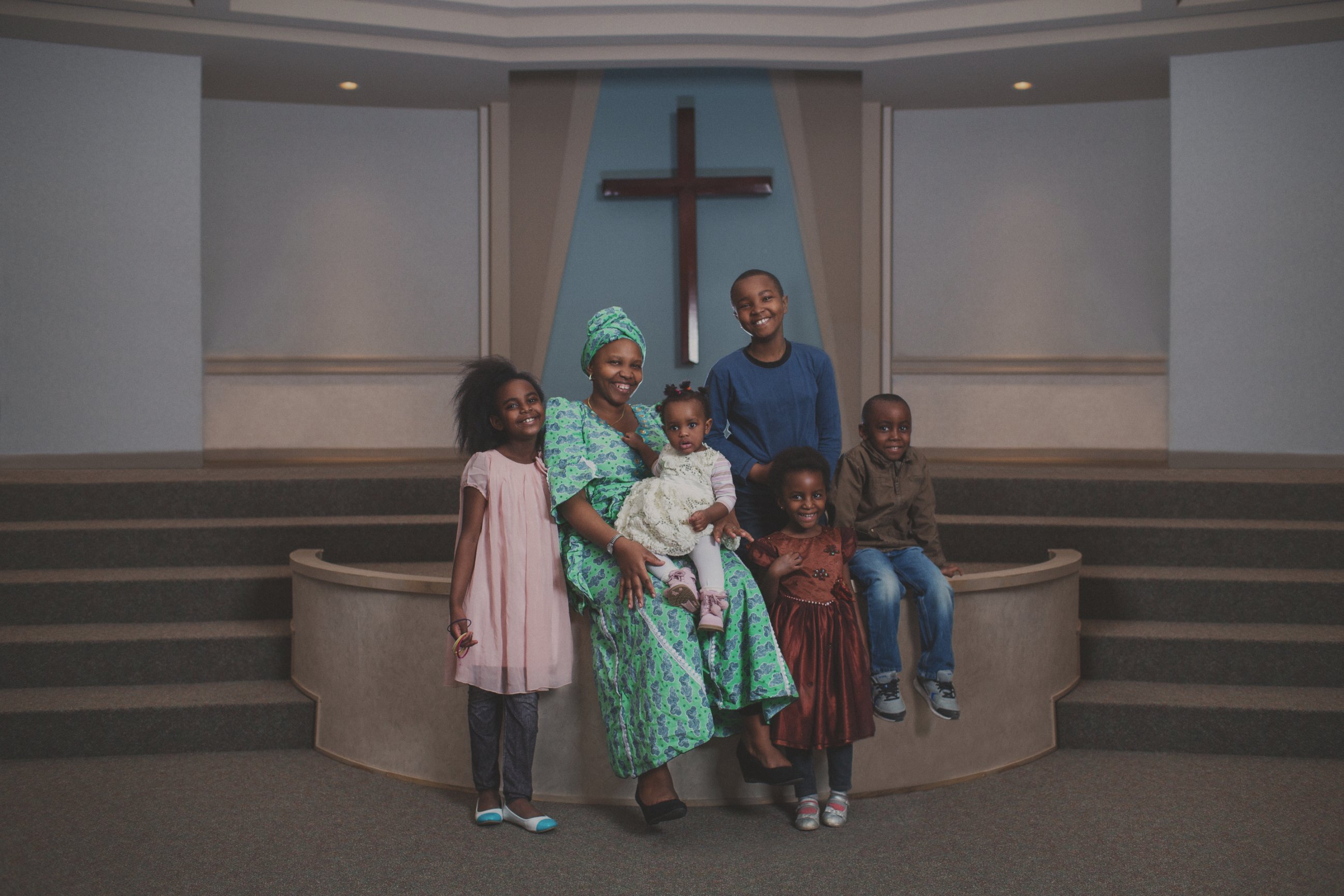
Christina, married with one child, lived in a small town in Congo, near the city of Gorma. Her husband died, so she supported her son by cleaning offices in the airport.
As Congo deteriorated into a country with no peace, but fear, “with shooting, running all the time, just waiting to lose life”, she needed to leave, to preserve their lives. Christina fled to Uganda, across the border from the Congo, to a refugee town where she supported herself and her son by washing clothes, cleaning houses, and odd jobs. (Some refugees, who were able to support themselves did not have to live in the camps.) However, she worried about her 2 brothers, who were missing after they fled. 2½ years later, the widow met another man, married and had 2 more children.
Christina had registered herself, children, and brothers with the Office of the Refugees in Uganda. After she married, however, her husband was not properly documented on the refugee application. When Christina left the refugee town, she was pregnant, and had with her two of her young children and three other orphans (a promise made to a friend dying of HIV—“please look after my children and give them a home, everyone else has died! ”) Her husband and 3 yr. old child had to remain behind, in Uganda. She arrived in Regina, Saskatchewan with five young children on March 25th, 2015.
According to Christina, Regina Open Door Society “did everything to help.” Assigned a Caseworker, Christina was introduced to all the essentials needed for her first months in her new home. In addition, she was embraced by a church congregation that has made her “feel like a daughter, giving me hope and courage.” Parliament Community Church members have gone out of their way to assist her and the children, helping her “like a parent with their child”, and providing the childcare needed for Christina to take the necessary English classes. Her “Angel Mom, Mama Vicki”, along with other congregation members, make her feel “so happy.” They are also assisting her in attempting to bring her son to Canada, accompanied by her brother, who survived, and has been found. The improper documentation is making it very difficult to bring her husband.
Christina loves Regina, and is so thankful to be here. Although she speaks five different languages she is working hard towards the goal of speaking English well, so she can better communicate and earn a living to support her children. She wants the community to know that she believes “If I can communicate with Canadians, I can make a future for my children.”
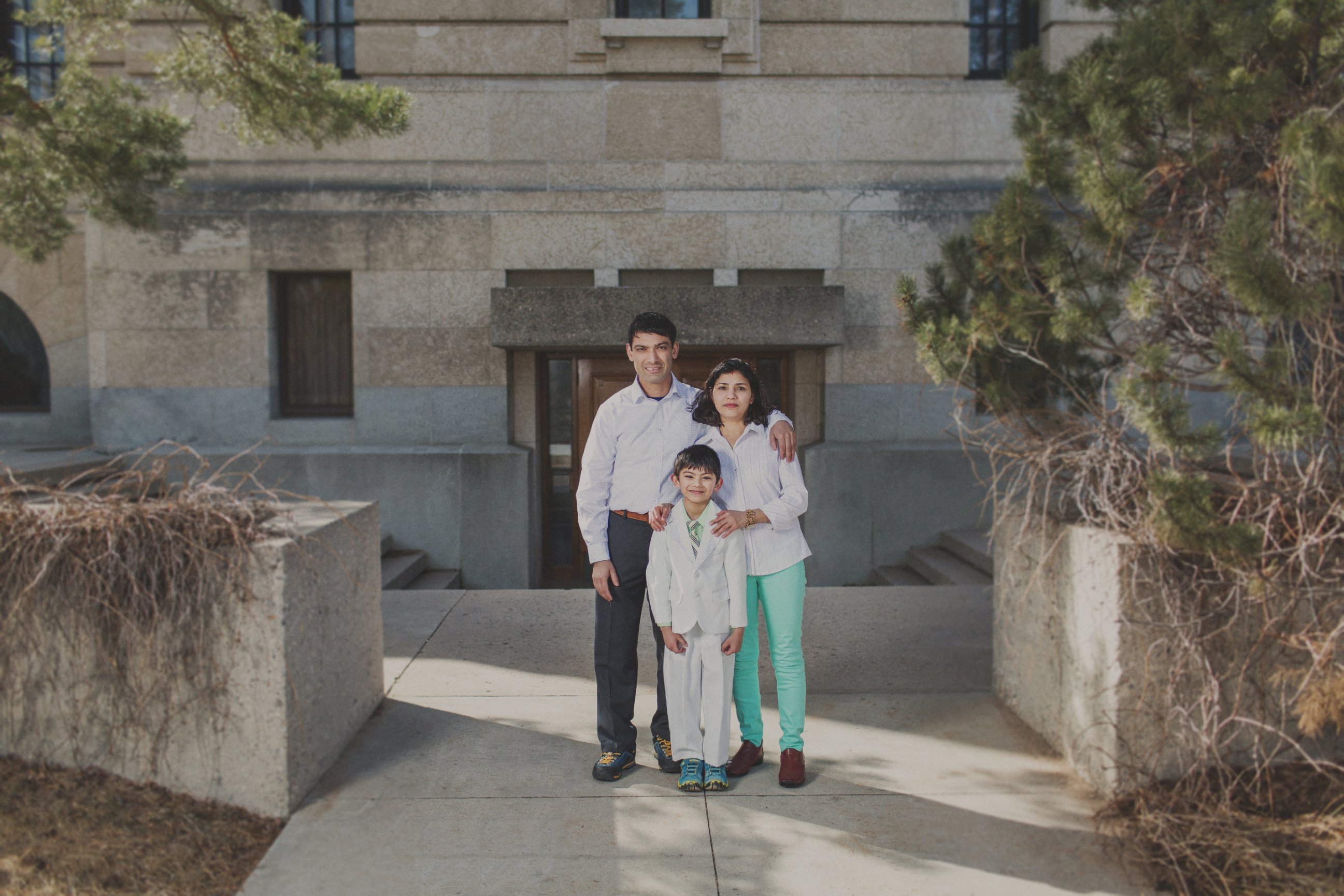
Growing up in Bhutan, Ghana spent weekends on the family farm, attending the town school on weekdays. After the King closed all rural schools, his businessman father took him to India for school. At age 12, for 6 months he stayed by himself in a hostel. Returning home, he was apprehended by border police, as he had no identification. Taken to the India/Nepal border, rather than home, he was told to ”Go to the refugee camp”, which would cost 50 rupees. With only 20 rupees, he sat alone by the side of the road in a strange country, and an unknown language. Through the kindness of strangers, he finally arrived at the camp, where to his shock, he found an aunt. He never saw his childhood home again, and can never go back.
Life In the refugee camp involved working, morning and evening, to buy books for school. Ghana completed most of his high school in the camp, but went to India for grade 12, with a partial scholarship that paid for books. He tutored children in the evening in order to pay rent, and returned to the camp on weekends. He eventually completed a Bachelor or Commerce with Accountancy Honors, (the only one in the class to pass), then received an MBA in Management. Offered a good job in India, he couldn’t accept, as refugees were not allowed to work. Hopeless, he taught in the refugee school for an honorarium of 600 rupees/month - equivalent to $7.50/month. (80 rupees = $1)
His future wife fled from Bhutan with her family, sneaking through the forest at midnight to avoid being shot. A baby sister was born in India 13 days later. They made their way to one of the 5 refugee camps in Nepal (130,000 people), where they lived in bamboo huts with thatched roofs. Kalpana’s mother placed mud-covered sacks around the bottom of the hut to keep the rain out, and covered the walls with paper to stop the wind. Having no money, they grew a small garden and foraged in the forest for food. After Grade 8, Kalpana taught children in the camp but continued her studies at night, often by candlelight. Later, travelling once a year to India to write college exams, she eventually graduated with a BA in Sociology/Anthropology and English.
With resettlement offered, the couple’s marriage was arranged, and within 3 months they were married, and Ghana moved to Kalpana’s camp, with her family. After 2 years processing, the extended family of 16 came to Regina with joy, after 18 years in the Refugee Camp!
Praising Regina Open Door Society, they emphasized the smooth transition. The change from a jail-like setting to complete freedom in an unknown country can be traumatic. Case workers assisted, volunteers became friends and people were friendly, helpful and polite. They and their 6 year old son love Regina! They exclaimed, “Millions and millions of thanks to them”!
Ghana and Kalpana, already homeowners, home daycare operators, hardworking employees, and tireless volunteers, expressed a great desire to give back to their adopted community. They hope to open a community Daycare Centre, as Kalpana is working toward completing her Early Childhood Education Diploma (Level 3). Knowing the frustration of unrecognized degrees, their goal is to help other newcomers gain Canadian experience while utilizing their skills and learning English. “Newcomers have many skills, but, unable to work, get depressed and feel worthless.” Although they “wish that businesses would give opportunities to newcomers”, they are so thankful, and say to Regina - “Thank you for giving us a hope and a future”.
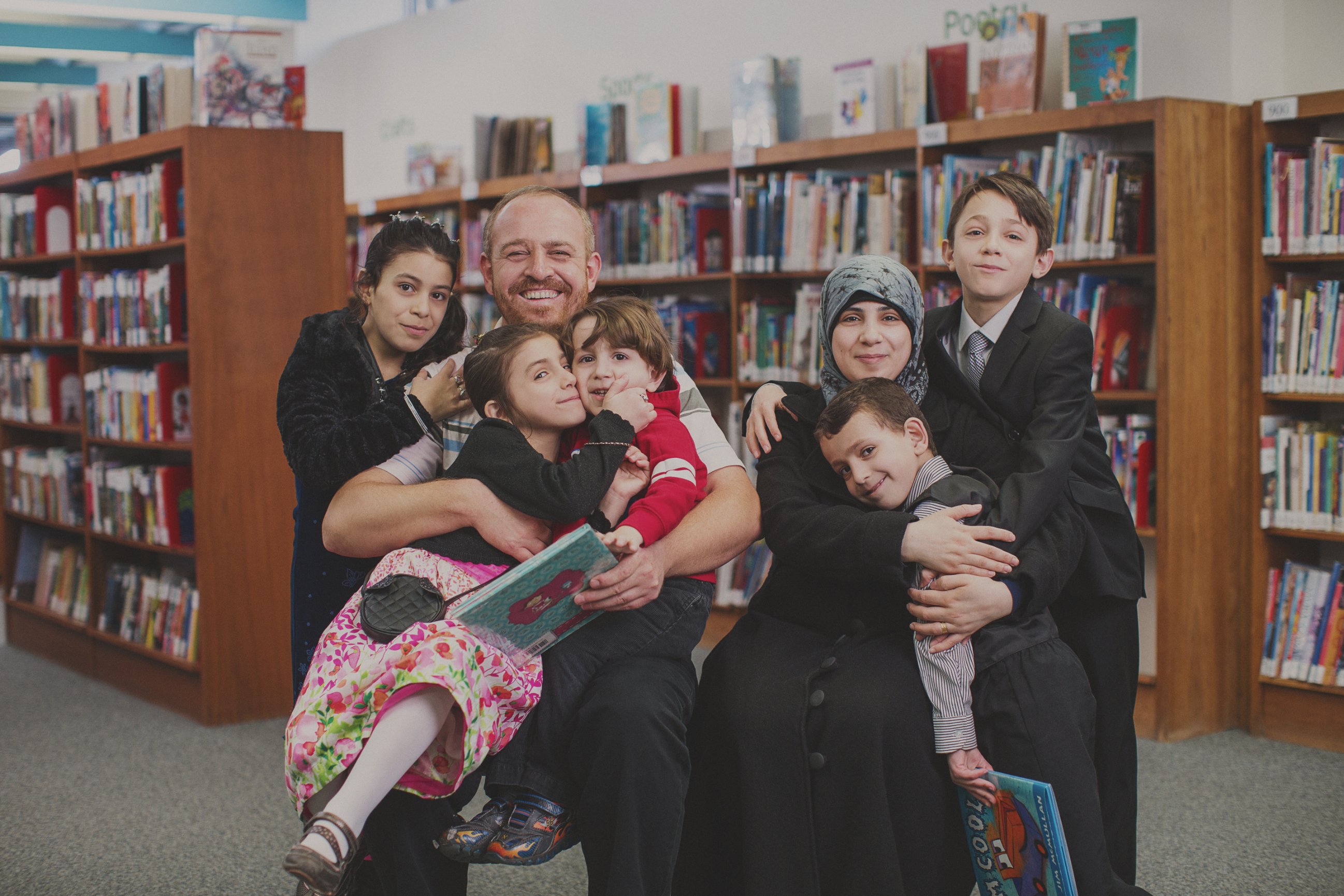
Rasheed and Aisha lived in the city of Homs, Syria when war broke out. When It was bombed, they fled for their lives to the nearest refugee camp, Zatari. Located in the desert, constant windstorms were the norm, with the red dust causing difficulty breathing. Many babies died at birth because of the dust, and with Aisha being pregnant, they knew they must go. No one was allowed to leave the camp and more refugees flooded in daily. The washrooms were about a mile away – difficult for small children and pregnant women.
With monetary persuasion, guards allowed some people to sneak out. A doctor gave them the $100 needed, and the family of 6 fled to Jordan at midnight. Relatives took the family in for a few days, then they moved to another relative’s apartment, where the landlord allowed them to stay. He also helped Rasheed to find a job painting houses, a big change from the glass factory where he had worked for many years.
Two and one-half years later, Dec. 2014, the family arrived in Regina, knowing no English. Through the assistance of Regina Open Door Society Settlement workers, and the Life Skills worker, they have settled into an apartment. They are so thankful for the welcoming community and the assistance of a host family, who has become a friend.
Having a job to provide for the family is very important to Rasheed. He is not comfortable without a job and said, “My spirit and mind will be stronger, and a job will give me value”. Believing the key to success is knowing English, both spouses are in part-time classes, but have been challenged with coordinating their class schedules with those of the school-aged children. RODS English classes have been essential. For Rasheed, the additional weekly assistance of an individual tutor from the library has been helpful in accelerating his language learning, to achieve his goal of finding a job. Employment will not only provide for the family here, but will also help those left behind. The family expressed great concern for siblings and parents, some they haven’t seen for years, and a desire to bring them “to Regina, a place of peace”.
They stressed that “for the Syrian refugees, getting a driver’s license is important, but the $500 cost (each) is prohibitive”. They also said “dental work is needed by many of the refugees, but very expensive.”
The family also wants to give back – to work as volunteers, to share their skills and talents and to help other newcomers. They believe the key to success is mastery of the language, so appreciate everyone being so friendly, helpful and patient as they try to communicate while settling in their new home, with the ultimate dream of opening a Syrian restaurant.
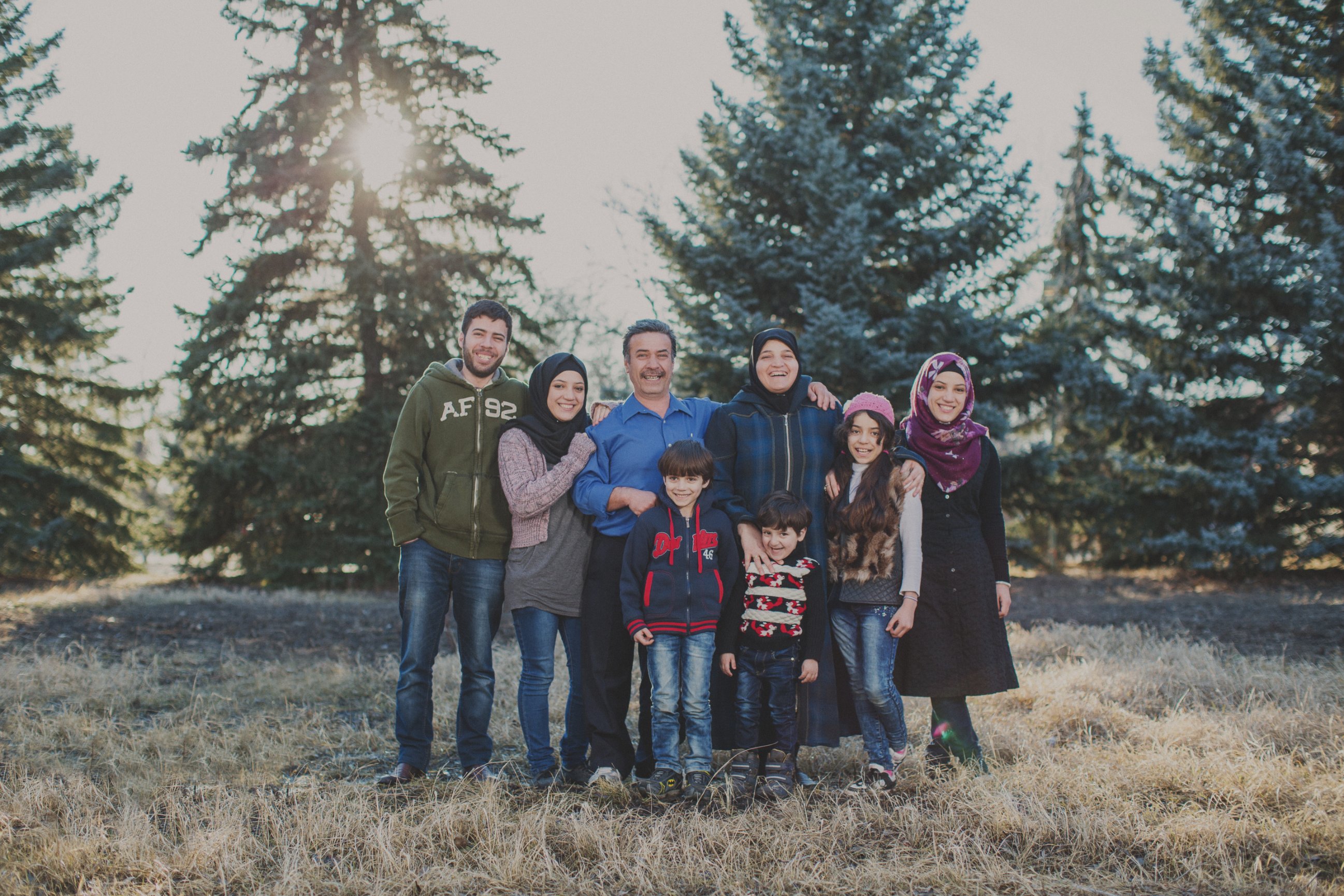
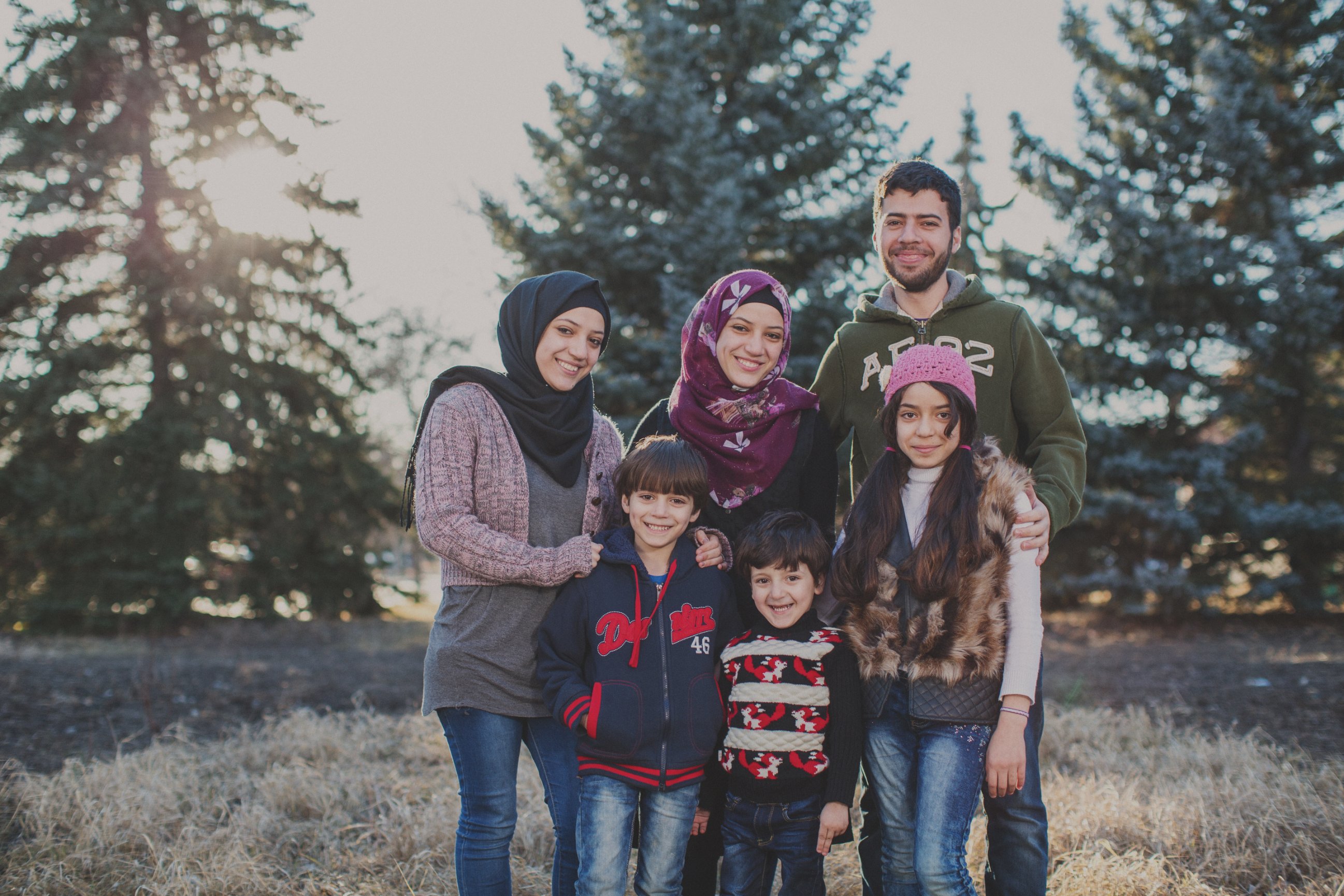
A professional chef by trade, Adnan and his wife Samira, together with their 7 children, fled from their home in Syria to the desert. They begged for food for the children from the police, then made their way to the Zatari refugee Camp, on the border with Jordan. At +40C during the day, and -25c at night, it was a harsh place for children. The family paid a guard, so they could escape to a city in Jordan, where they lived with 3 other families in a 3-room apartment. Jordan was difficult – documents were taken, and the family did not feel welcomed or wanted. As it was illegal to have so many people in a small apartment, they moved from house to house looking for a place to stay, but rent was very expensive. Syrians were not allowed to work in Jordan and if caught, they could be sent back to Syria. However, desperate to look after their families, many were hired but exploited, being paid $8 /20 hours work.
Feras, the eldest son, had his anesthesiologist training interrupted – his years of schooling were completed, but the necessary hospital training is unfinished. The 18-yr old daughter, married with a baby, was required to stay behind or come to Canada without her husband and infant, as she was not married when the application was made. The family is anxiously hoping that they can raise enough funds to sponsor her, so that the family can reunite. Unfortunately, often family members are sent to different countries, and continue to be separated.
When the family recently learned they would be coming to Canada, it was their “happiest day”, and they “danced out of happiness”. On Jan 8, 2016, they began their new life in Regina. The children are happy in school and one daughter is now the ‘interpreter’ in her Grade 6 class! “She LOVES English!”! English classes for the adults will be starting soon.
According to the family, “Regina people have been very welcoming – friendly, generous, respectful and willing to help.” In fact, the family was befriended by the hotel manager, where they first stayed. He has taken them on outings, and they discovered Wascana Park, already their favourite place in Regina.
Their desire is to find employment, in order to look after their own family and become independent and self-sufficient. Affordable housing and food would be very helpful in this transition for them and other newcomers, who find that “often when rent is paid, there is little left over for food”.
Even with the challenges of transportation, lack of language and unfamiliarity with the city, they said, “being safe, and living in a peaceful country without fear, has enabled us to start thinking about the future” and “allows us to dream about a new beginning - finishing school, starting fresh by making friends, learning English and reuniting with the whole family”. They are so thankful for Canadians and especially the Regina community, their new home.

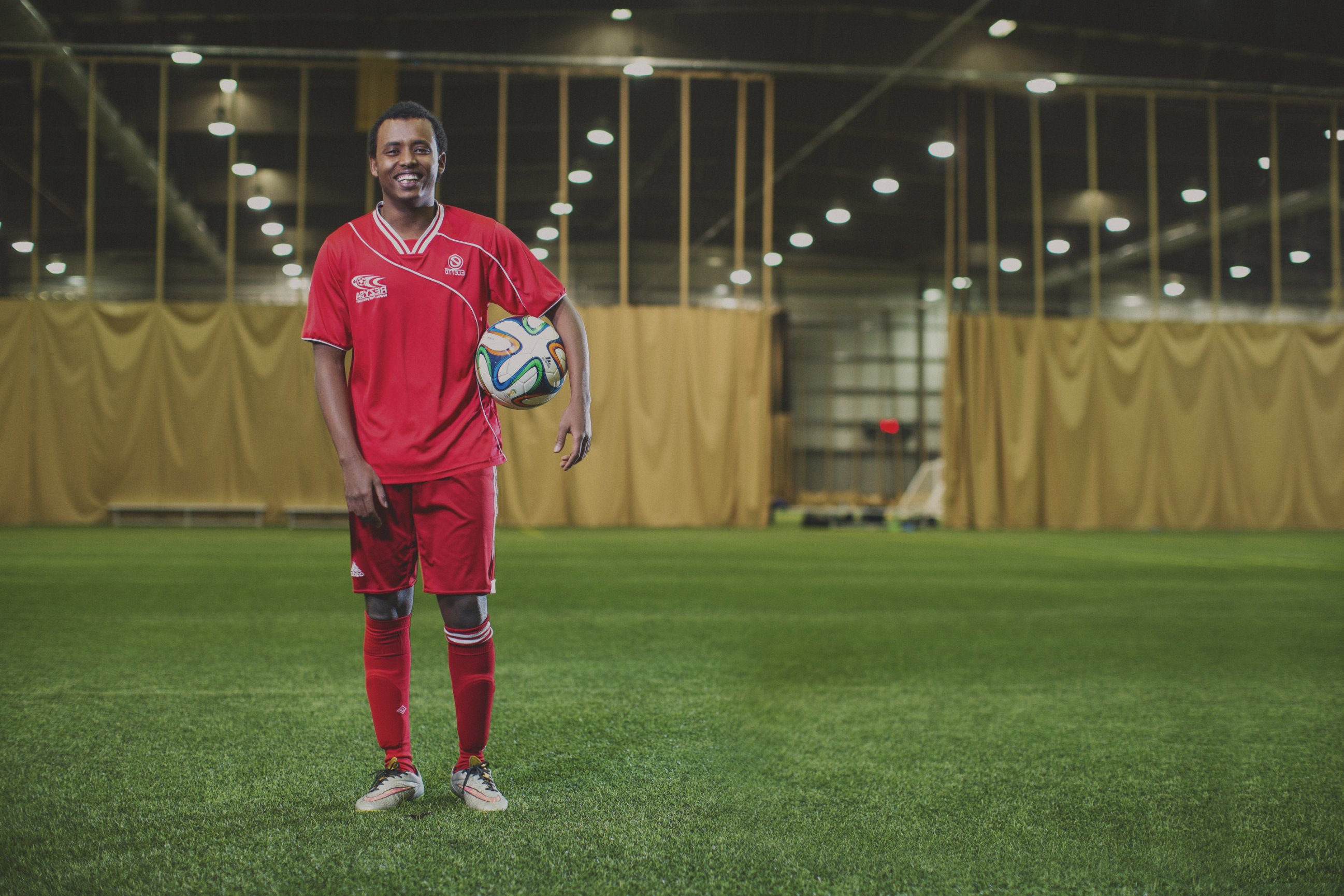
Mensur was born in Eritrea (East Africa) in a community with a temperate and beautiful climate. Life was stable for Mensur and his family. His mother owned her own business and his father was an administrator of the town (similar to a mayor’s position in Canada). Mensur was a typical child with little to worry about, who enjoyed playing sports and wasn’t interested in school.
According to Mensur, “Everything was good, life was good, until my father was arrested. Most refugees have a stable life before a sudden change (war, danger) forces them to leave their home.” Once his father was released from jail, his parents realized it was too dangerous to stay. Mensur and his family moved to the country of Sudan. From Sudan, the family eventually made their way to Ethiopia to a refugee camp with a small village-like population of approximately 17,000 people. While in the camp, Mensur enjoyed playing what was to become a passion of his—soccer. He also took language classes and settled into enjoying elementary and then high school. Mensur studied hard and received a ‘4’, the highest grade possible in a ‘National Exam’. During his high school years at the refugee camp, he achieved a 97% average.
It is easier for single mothers to be accepted as refugees, so the family made the difficult decision to separate, hoping to reunite in the future. His mother and siblings made their way to Canada in September, 2014. Upon arrival, the community of Regina was friendly and welcoming. Mensur stressed that the help they received from Regina Open Door was so important to them. He currently attends school at Balfour Collegiate, plays soccer, and received the ‘Best Player’ award last year. He has achieved excellent marks, with a scholarship in place for his first year at the University of Regina.
Although Mensur knows five languages and has adapted well, life has been difficult for his mother. With little language acquisition, the transition from business owner to life in Canada hasn’t always been easy. Mensur wants his new community to know that just because many refugees cannot speak the language, it does not mean they are unintelligent or uneducated. His mother is a great example of strength and knowledge. Despite the challenges, Mensur and his family are persevering and hoping to bring his father to Canada to join them soon.
With dreams of one day becoming a Neurologist, Mensur wants his new community to know that their welcoming nature has made it easier for him and his family and that he is happy to be here, with the exception of the cold weather!
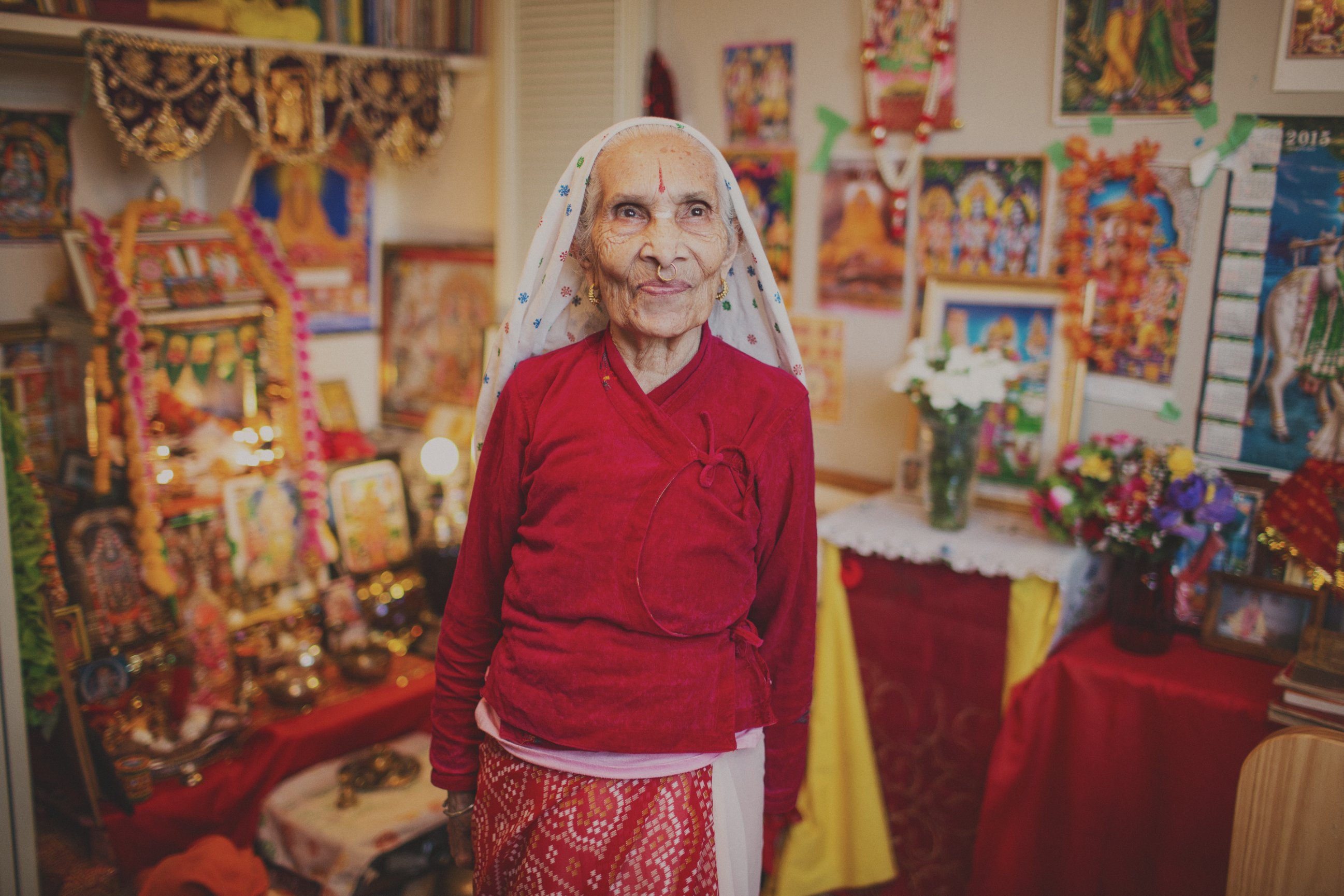
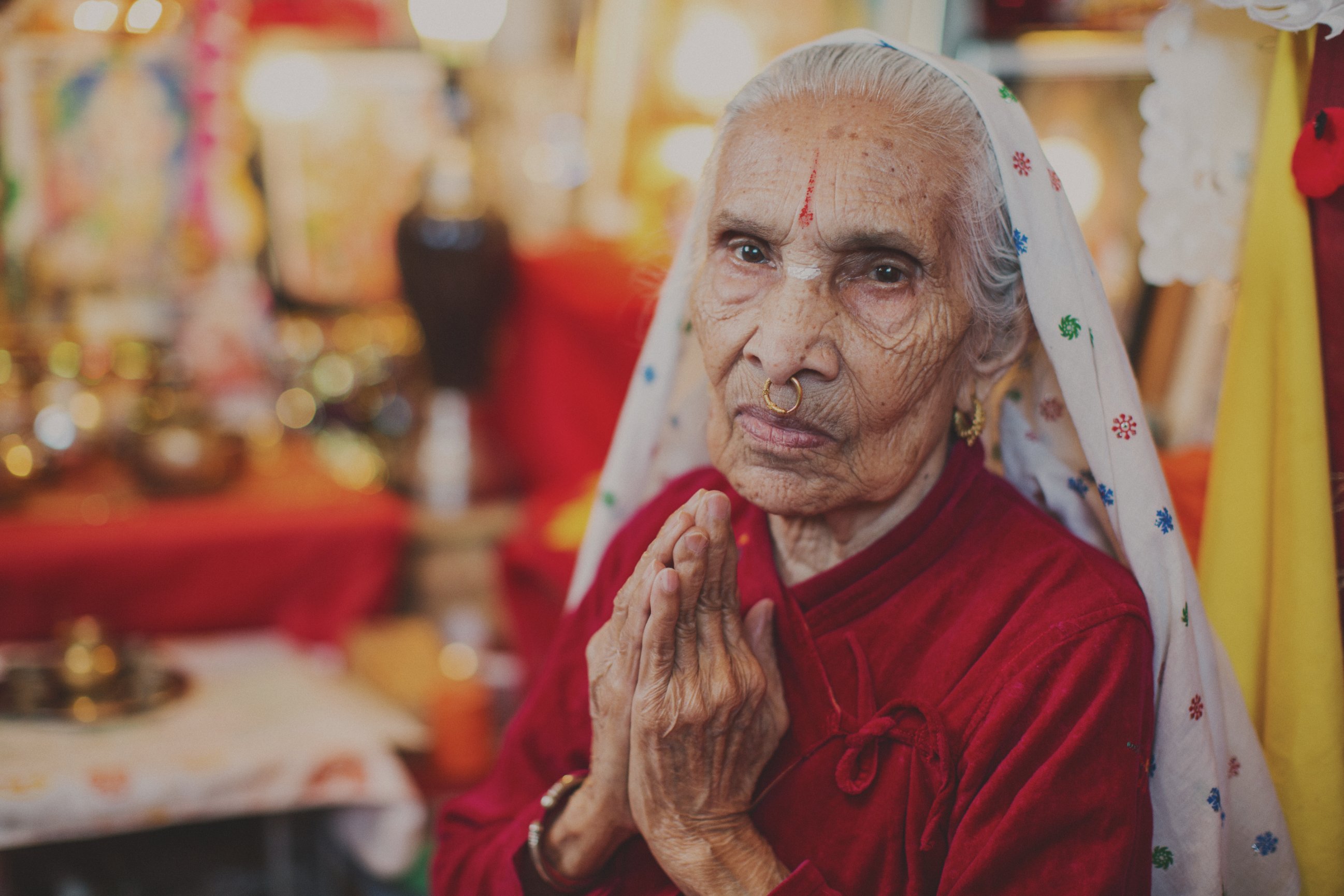
Bhagiratha lived on a farm near a small village in Bhutan. Farms produced their own food, but needed to buy a few staples. Although vegetarians, sheep and goats were kept to sell (to buy the essentials – salt, oil and kerosene). The nearest market was a 3 day walk each way, and supplies were carried in a basket secured to the forehead by a strap. There was no electricity, so kerosene lamps were used for light.
Bequeathed to a husband at 5 years of age, Bhagiratha left her home when she was 10, going to live with her husband’s family. She cooked and cleaned for the entire household, making meals that included rice, vegetables, lentils, lettuce, milk, and yogourt ( from their own cows). As some farmland was at a distance, she hulled the rice and prepared the vegetables necessary for the men for a week away, while continuing the daily routine. Operating a 12 acre farm, millet and rice were planted by hand (after sprouting, individual shoots were planted in rice paddies or fields by all the neighbouring families, going from one farm to another). Bhagiratha rarely slept more than 3 to 4 hours a night, as cooking, cleaning and caring for others while living with no conveniences, took most of her time and energy.
A mother at 20 years old, she was never formally schooled, as women were “not allowed to touch books in Bhutan.” She eventually had 6 children, all sons. Bhagiratha and her family left their home, because the army would force boys to work as slaves. If the boys hesitated, they would be killed and buried in front of the parents. The army wanted the fertile land, so forced the Bhutanese farmers out. The family made their way to a refugee camp in Nepal where they spent the next 18 years.
Bhagiratha was widowed in 1992, faced with a life without her husband and left to raise her children. The refugee camp was difficult, as there was little food and water. Her sons grew up and married. One taught her to read and write Nepali. Some of Baghiratha’s grown children and grandchildren came with her to Regina, but families were separated, and others went to the US. She stressed that she “came for a better life for my children.” When she and family members arrived, Regina Open Door Society was extremely helpful. She loves to study, relished going to classes and would like to continue learning, especially English. She spends hours practicing her letters, but has also discovered art and loves drawing. A new Canadian citizen, she recently voted in her first election. She wishes good things for her children and grandchildren, many of whom have achieved much (son/PhD).
At 92 years of age, Bhagiratha wants the community of Regina to know that she is “so happy and thankful as Regina is a good place, people are kind and welcoming.” She also stresses that she “wants Canada to remain good, with no fighting and all live together in peace.”